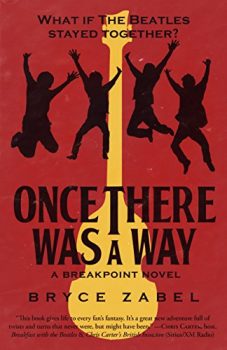A to Z Review: Once There Was a Way, by Bryce Zabel
The Beatles were one of the most important bands of the twentieth century, but at the same time, and despite the massive Beatlemania the accompanied them, they only really existed in the public consciousness for eight years and 12 albums. Their breakup in 1970 when they apparently had so much to offer has meant that fans have long wondered what would have happened if they had remained together, had a reunion, anything.
Among those fans are several authors who have written alternative histories in which the Beatles’ story had played out differently. Stephen Baxter tackled the topic in the short story “The Twelfth Album,” Ian R. MacLeod explored a John Lennon who quit the Beatles before they made it in “Snodgrass,” the Beatles went their separate ways during the “Please, Please Me” sessions in Larry Kirwan’s Liverpool Fantasy, and Michael A. Ventrella and Randee Dawn edited an entire anthology of alternate Beatles stories in Across the Universe. Films, such as Yesterday have also tackled the idea of the Beatles not existing.

In 2017, Bryce Zabel published the novel Once There Was a Way, which postulated the Beatles continuing to produce work throughout the first half of the 1970s both as a band and as individuals. In addition to one album a year, they make another film (The Lord of the Rings). An amicable break up following a concert in Central Park means the band is able to occasionally have reunions.
Zabel details the creation of numerous albums in the book, both as a band and as by the individual musicians, often built from the work they actual did, pieces that were cut from consideration on Beatles albums, as well as original titles. In many ways the novel reads as a utopian view of what the fans would have liked to have seen over the years.
Although all four of the Beatles (and their various wives) are important to the novel, the focus in on John Lennon, who is presented as someone contrary and not particularly likable. While Lennon certainly demonstrated those qualities, he was also a joker and had positive qualities which allowed him to become friends with the other Beatles, create the band, and write the songs he did, even if he eventually let Paul McCartney take more control of the band, which further led to his disillusion with being a Beatle.
When Zabel looks at the world beyond the Beatles’ proximity, the changes affected by their remaining together aren’t that different. Barack Obama and Donald Trump, for instance, continue on their paths. At the same time, a chance encounter between George Harrison and a young American at a retreat in India leads to Apple Corps. Moving in a completely different direction, ultimately improving all the Beatles’ fortunes. It is often said the art, and music, can change the world, and it does in Once There Was a Way, but the change in ultimately minimal outside the confines of the Beatles.
That being said, Zabel clearly knows his subject well and his attention to detail and his exploration of the changes that did occur lead to Once There Was a Way winning the Sidewise Award for Alternate History in 2017, Zabel’s second award. He had previously won for the alternate John F. Kennedy novel, Surrounded by Enemies.
 Steven H Silver is a twenty-time Hugo Award nominee and was the publisher of the Hugo-nominated fanzine Argentus as well as the editor and publisher of ISFiC Press for eight years. He has also edited books for DAW, NESFA Press, and ZNB. His most recent anthology is Alternate Peace and his novel After Hastings was published in 2020. Steven has chaired the first Midwest Construction, Windycon three times, and the SFWA Nebula Conference six times. He was programming chair for Chicon 2000 and Vice Chair of Chicon 7.
Steven H Silver is a twenty-time Hugo Award nominee and was the publisher of the Hugo-nominated fanzine Argentus as well as the editor and publisher of ISFiC Press for eight years. He has also edited books for DAW, NESFA Press, and ZNB. His most recent anthology is Alternate Peace and his novel After Hastings was published in 2020. Steven has chaired the first Midwest Construction, Windycon three times, and the SFWA Nebula Conference six times. He was programming chair for Chicon 2000 and Vice Chair of Chicon 7.
